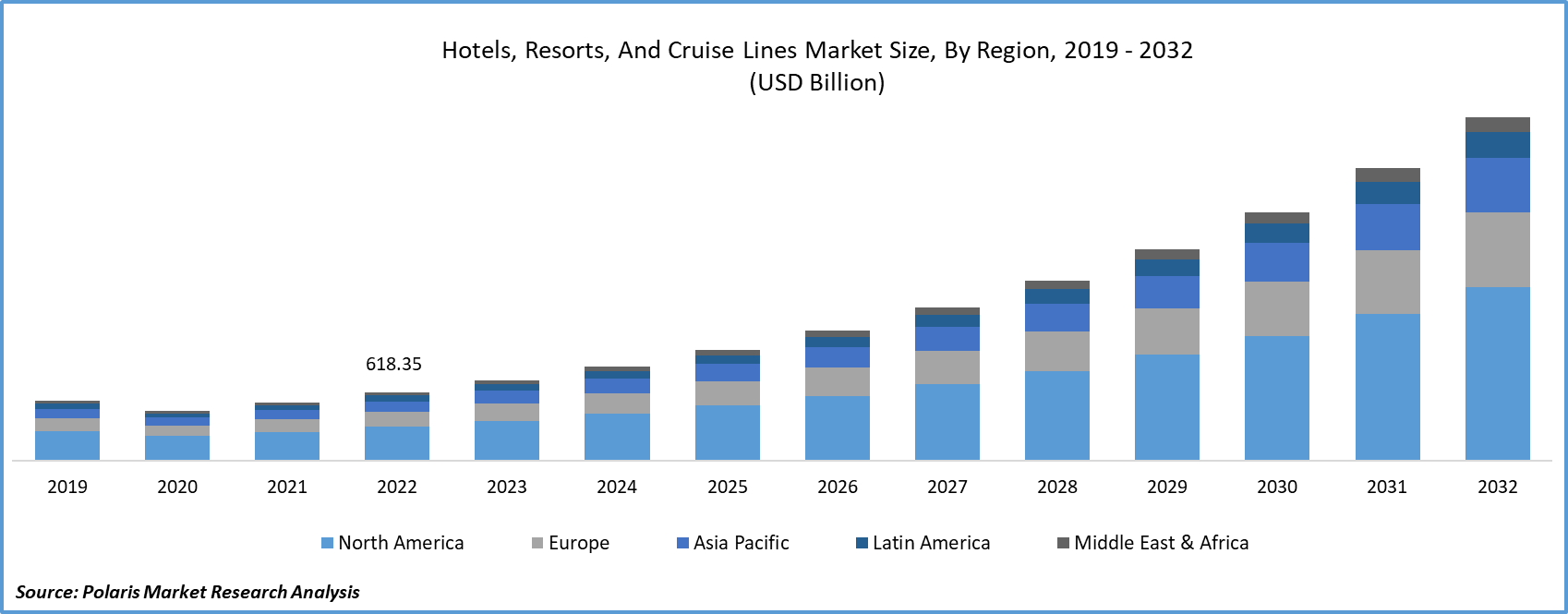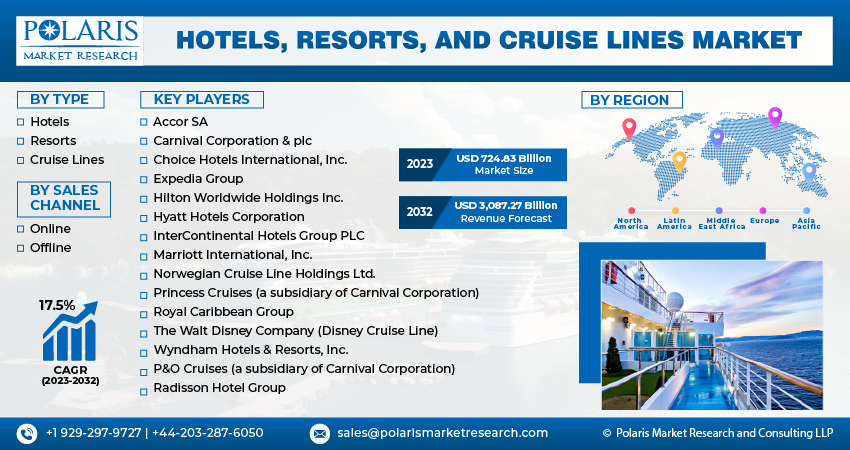
Hotels, Resorts, and Cruise Lines Market Share, Size, Trends, Industry Analysis Report, By Type (Hotels, Resorts, and Cruise Lines); By Sales Channel; By Region; Segment Forecast, 2023- 2032
- Published Date:Nov-2023
- Pages: 115
- Format: PDF
- Report ID: PM4038
- Base Year: 2022
- Historical Data: 2019-2021
Report Outlook
The global hotels, resorts, and cruise lines market was valued at USD 618.35 billion in 2022 and is expected to grow at a CAGR of 17.5% during the forecast period.
The research report offers a quantitative and qualitative analysis of the hotels, resorts, and cruise lines market to enable effective decision-making. It covers the key trends and growth opportunities anticipated to have a favorable impact on the market. Besides, the study covers segment and regional revenue forecasts for market assessment.
The hotels, resorts, and cruise lines encompass a diverse range of businesses, each catering to distinct segments of the travel industry. Hotels provide lodging services, while resorts offer a comprehensive experience, often featuring additional amenities like spas, recreational facilities, and fine dining. Cruise lines, on the other hand, provide a unique form of travel, combining accommodation, dining, and entertainment on floating vessels that traverse various destinations.

To Understand More About this Research: Request a Free Sample Report
Modern travelers seek experiences that go beyond the standard amenities. They crave authentic, immersive encounters with local cultures and environments. Hotels, resorts, and cruise lines have responded by curating unique experiences such as culinary tours, adventure excursions, and cultural immersions.
However, with growing environmental consciousness, the industry is increasingly adopting sustainable practices. From energy-efficient designs to waste reduction initiatives, many establishments are prioritizing eco-conscious operations. Cruise lines, in particular, are investing in advanced technologies to reduce emissions and minimize their ecological footprint.
- For instance, in July 2023, Hotel Alliance (GHA) entered into a collaboration with Regent Seven Seas Cruises, a luxury cruise travel, headquartered in Miami, Florida for extending its acclaimed loyalty program, GHA DISCOVERY This distinctive venture marks the inaugural instance of a cruise line aligning with GHA, uniting two foremost luxury brands within the travel industry.
However, hotels, resorts, and cruise lines operate in a heavily regulated environment, requiring compliance with a myriad of local, national, and international standards. Navigating these regulatory landscapes can be complex and demanding.

For Specific Research Requirements: Request for Customized Report
Also, the travel industry is susceptible to economic fluctuations and geopolitical events, impacting consumer spending and travel patterns. Economic downturns or unforeseen crises can have a significant impact on the market. Furthermore, the rise of online platforms offering vacation rentals and home-sharing options has introduced formidable competition to traditional establishments. Hotels and resorts must differentiate themselves through unique offerings and exceptional service.
Growth Drivers
- Increasing awareness of health and wellness programs is projected to spur the product demand.
A rising awareness of health and wellness has led to an increased demand for facilities like spas, fitness centers, and wellness programs. Resorts, in particular, are capitalizing on this trend by offering specialized packages focused on rejuvenation and relaxation.
Health and Wellness Tourism has emerged as a robust and thriving sector, driven by several key growth factors. Firstly, an increasingly health-conscious global population seeks holistic well-being, prompting a surge in demand for wellness-oriented travel experiences. Travelers are now prioritizing destinations and accommodations that offer activities like yoga retreats, spa therapies, and fitness programs, contributing significantly to the industry's expansion.
Moreover, advancements in medical technology and a growing preference for alternative and complementary therapies have bolstered the appeal of health and wellness tourism. Many travelers are now seeking destinations renowned for their medical expertise, rejuvenating therapies, and holistic healing practices. This has led to the development of specialized medical tourism hubs around the world.
Report Segmentation
The market is primarily segmented based on type, sales channel, and region.
|
By Type |
By Sales Channel |
By Region |
|
|
|
To Understand the Scope of this Report: Speak to Analyst
By Type Analysis
- Hotels segment accounted for the largest market share in 2022
The hotels segment accounted for the largest hotels, resorts, and cruise lines market share in 2022 and is likely to retain its market position throughout the forecast period, owing to the expanding global middle class, coupled with rising disposable incomes, which has ignited a surge in travel, intensifying the demand for accommodation. This trend is further amplified by an increasing preference for experiential travel, wherein accommodation is regarded as an integral component of the overall journey.
Moreover, the ascent of online booking platforms and travel agencies has streamlined the process of discovering and reserving accommodations, resulting in heightened occupancy rates. The pervasive integration of technology in the hotel sector, encompassing mobile check-ins and intelligent room features, has elevated the guest experience, drawing a broader spectrum of travelers.
Furthermore, a surge in international tourism and corporate travel has driven the establishment of hotels in pivotal destinations, fostering a competitive environment that stimulates innovation and upholds service quality. Consequently, the hotel industry remains a dynamic and resilient sector, displaying a promising trajectory for sustained growth.
The resorts segment is expected to witness the highest growth during the forecast period. This surge can be attributed to the escalating popularity of leisure and luxury travel among consumers. Resorts offer a host of advantages, including convenience, comfort, and a conducive environment for relaxation. They also present a diverse array of both indoor and outdoor activities, enriching the guest experience.
These factors collectively contribute to the flourishing of this segment. Additionally, the availability of a wide variety of resorts, ranging from mountain-top getaways to beachfront retreats, further fuels its expansion. Furthermore, the increasing attraction towards all-inclusive resorts, known for their stress-reducing benefits, constitutes a significant driving force behind the segment's growth.
By Distribution Channel Analysis
- Offline channel is expected to witness highest growth during forecast period
The offline channel segment is projected to grow at a CAGR during the projected period. While online booking platforms dominate the hospitality industry, offline channels retain significance. Travel agencies, direct phone reservations, and walk-ins remain crucial for hotels and resorts. Some guests prefer personalized interactions and expert advice, making travel agencies a valuable offline channel. Moreover, direct phone reservations offer a human touch, especially for complex bookings or special requests. Walk-ins provide last-minute options and spontaneous bookings, catering to travelers seeking immediate accommodation. Offline channels continue to serve a diverse clientele, emphasizing the enduring importance of personal connections in the hospitality sector.
Regional Insights
- North America region dominated the global market in 2022
The North America region dominated the global market with the largest market share in 2022 and is expected to maintain its dominance over the anticipated period. The North American hotels, resorts, and cruise lines market is a thriving and diverse sector. With an array of options ranging from luxury resorts in coastal paradises to urban boutique hotels and world-class cruise experiences, it caters to a wide spectrum of travelers. North America's iconic cities, picturesque landscapes, and cultural attractions contribute to the region's popularity as a travel destination. Technological innovations, personalized services, and a strong emphasis on sustainability further enhance the guest experience.
The Asia-Pacific region is expected to be the fastest-growing region. Asia-Pacific boasts a wealth of cultural and natural attractions, ranging from ancient historical sites to pristine natural landscapes. These offerings hold a powerful allure for travelers seeking immersive and enriching experiences, drawing millions of visitors each year.
Infrastructure development has played a pivotal role in supporting this tourism surge. Substantial investments in modernizing airports, expanding transportation networks, and diversifying accommodation options have greatly enhanced accessibility to various destinations within the region.
Furthermore, proactive government initiatives aimed at promoting tourism have been instrumental. Many countries in the Asia-Pacific region have implemented policies and campaigns to attract visitors, ranging from streamlined visa processes to strategic marketing efforts showcasing their unique cultural and natural treasures.
Key Market Players & Competitive Insights
The hotels, resorts, and cruise lines market is fragmented and is anticipated to witness competition due to several players' presence. Major service providers in the market are constantly upgrading their technologies to stay ahead of the competition and to ensure efficiency, integrity, and safety. These players focus on partnership, product upgrades, and collaboration to gain a competitive edge over their peers and capture a significant market share.
Some of the major players operating in the global market include:
- Accor SA
- Carnival Corporation & plc
- Choice Hotels International, Inc.
- Expedia Group
- Hilton Worldwide Holdings Inc.
- Hyatt Hotels Corporation
- InterContinental Hotels Group PLC
- Marriott International, Inc.
- Norwegian Cruise Line Holdings Ltd.
- Princess Cruises (a subsidiary of Carnival Corporation)
- Royal Caribbean Group
- The Walt Disney Company (Disney Cruise Line)
- Wyndham Hotels & Resorts, Inc.
- P&O Cruises (a subsidiary of Carnival Corporation)
- Radisson Hotel Group
Recent Developments
- In October 2023, InterContinental Hotels & Resorts has unveiled a comprehensive worldwide brand transformation aimed at redefining the luxury travel experience. Guests at InterContinental properties can anticipate a host of novel features, an invigorated brand ethos, distinctive elements, and a revolutionary approach to food and beverage offerings and hotel design.
Hotels, Resorts, and Cruise Lines Market Report Scope
|
Report Attributes |
Details |
|
Market size value in 2023 |
USD 724.83 billion |
|
Revenue forecast in 2032 |
USD 3,087.27 billion |
|
CAGR |
17.5% from 2023 – 2032 |
|
Base year |
2022 |
|
Historical data |
2019 – 2021 |
|
Forecast period |
2023 – 2032 |
|
Quantitative units |
Revenue in USD billion and CAGR from 2023 to 2032 |
|
Segments covered |
By Type, By Distribution Channel, By Region |
|
Regional scope |
North America, Europe, Asia Pacific, Latin America; Middle East & Africa |
|
Customization |
Report customization as per your requirements with respect to countries, region and segmentation. |
Seeking a more personalized report that meets your specific business needs? At Polaris Market Research, we’ll customize the research report for you. Our custom research will comprehensively cover business data and information you need to make strategic decisions and stay ahead of the curve.
Browse Our Top Selling Reports
Healthcare Third-party Logistics Market Size, Share 2024 Research Report
Ready Mix Concrete Market Size, Share 2024 Research Report
Ophthalmic Drugs Market Size, Share 2024 Research Report
Fiber To The Home Market Size, Share 2024 Research Report
B2B Digital Payment Market Size, Share 2024 Research Report
